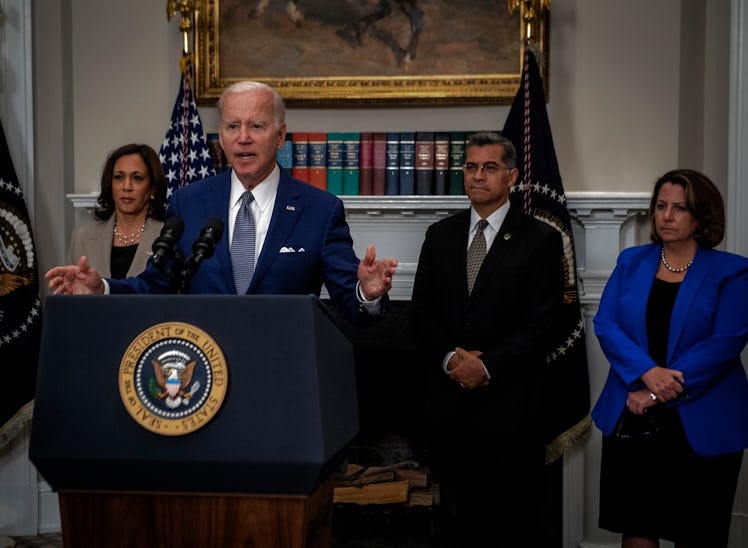
Biden Signed An Executive Order To Protect Abortion, But It's Only A First Step
The order came two weeks after SCOTUS overturned Roe v. Wade.
On Friday, July 8, President Joe Biden signed an executive order to protect abortion access following the Supreme Court’s overturning of Roe v. Wade on June 24. The president’s actions mark the first step in restoring the reproductive rights that Americans have had for the past 50 years. But what exactly is being addressed in the executive order? Here is Biden’s executive order on abortion access, explained.
Biden previously called the SCOTUS decision “a tragic error” and vowed to do “everything in his power to defend reproductive rights and protect access to safe and legal abortion,” according to the White House. Despite there being “no executive action” the president can do to restore Roe v. Wade, the executive order comes after pressure from Democrats and abortion advocates for the president to do more in response to the ruling.
In a series of tweets on July 8, Biden stated that he “will not allow an out of control Supreme Court working in conjunction with Republican officials” to push “an extremist agenda.” In a White House press briefing, the president said, “the fastest way to restore [Roe v. Wade] is to pass a national law codifying Roe” — which will be up to Congress to enact. Biden emphasized the November elections as a determining factor and encouraged Americans to “go out and vote.”
Until then, Biden’s executive order aims to safeguard access to reproductive health care, protect patients' privacy and access to accurate information, promote the safety and security of patients, providers, and clinics, and coordinate implementation efforts, according to the White House.
Much of the executive order relies on Secretary of Health and Human Services Xavier Becerra to provide a report to the president within 30 days on how the HHS plans to take action. Key takeaways from the order direct HHS to protect access to medication, abortion, family planning services, emergency contraception and IUDs, and to ensure emergency medical care will receive protections under the law.
The Attorney General and the Counsel to the President will also “convene private pro bono attorneys, bar associations, and public interest organizations” to assist patients, providers, and third parties seeking or offering reproductive health care. In addition, Biden’s executive order asked the Chair of the Federal Trade Commission to protect consumers from privacy violations and deceptive or fraudulent practices. HHS will issue new guidance on how patient privacy is protected under the HIPAA Privacy Rule and provide “a how-to guide” on protecting personal data on mobile apps.
To address the “heightened safety and security risks” in seeking and providing abortion care, the president asked the Attorney General and the Secretary of Homeland Security to take action to protect the “safety of patients, providers, and third parties,” including mobile clinics and pharmacies.
Finally, to ensure that actions in the executive order take place swiftly, an interagency Task Force will be established and led by HHS and the White House Gender Policy Council to coordinate implementation efforts. The Attorney General will be part of the Task Force to “provide technical assistance” appropriate and consistent with the law.
While the executive order is a promising move toward restoring Roe v. Wade, it doesn’t address measures including a commitment from the Justice Department to defend lawsuits and the use of Medicaid to fund travel for abortion services, Vox reported. Other options, such as declaring a public health emergency, are being considered, according to the White House gender policy council chair Jennifer Klein. “It is definitely not off the table,” Klein said during a July 8 press briefing, but added that it “didn’t seem like a great option” over concerns that the public health emergency fund has “very little money.”
If you or someone you know is seeking abortion care, here is what to know about traveling out of state and the 16 states that protect abortion care under state law. You can also donate to these organizations and abortion care providers that are supporting and funding reproductive health services.